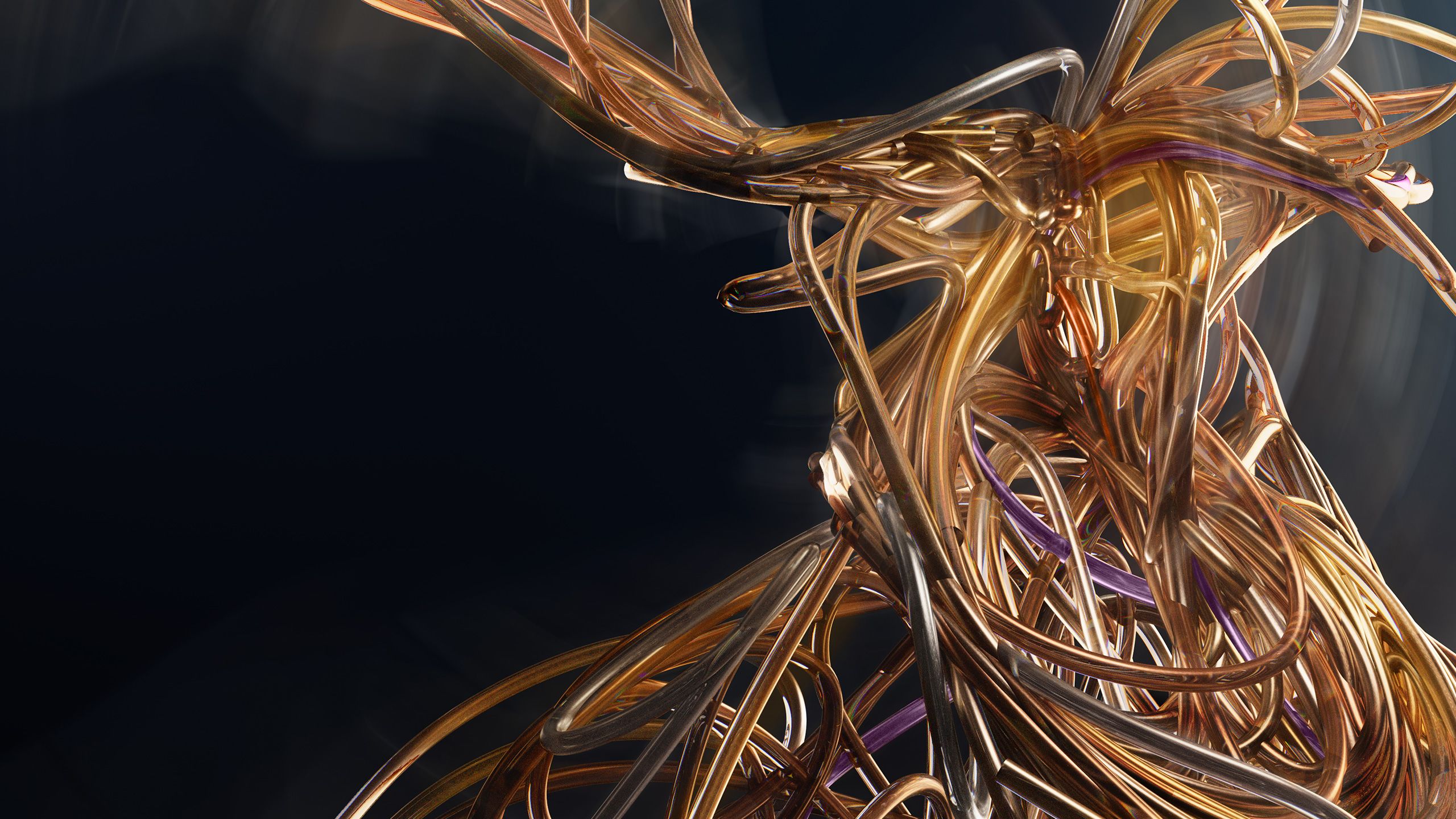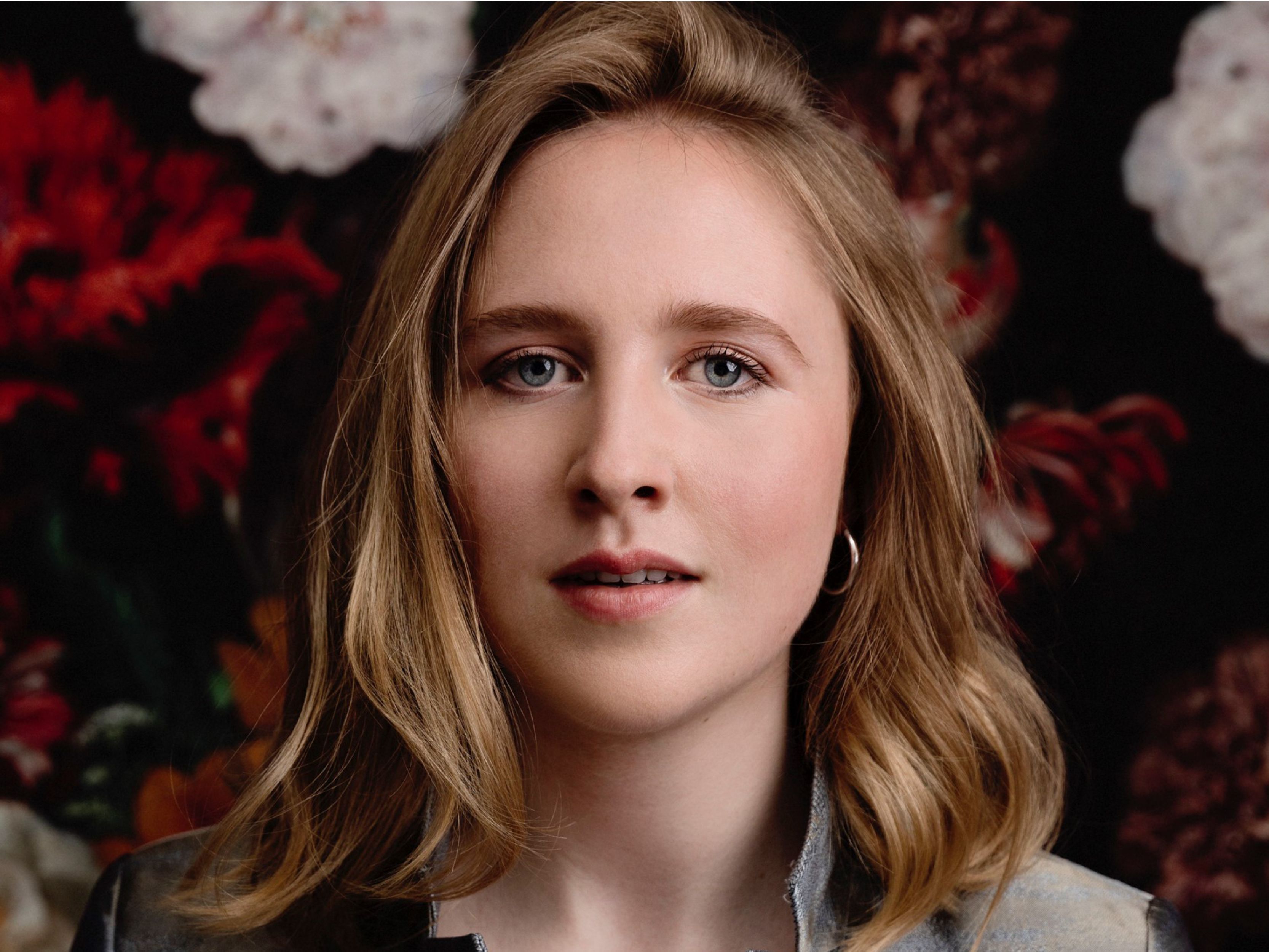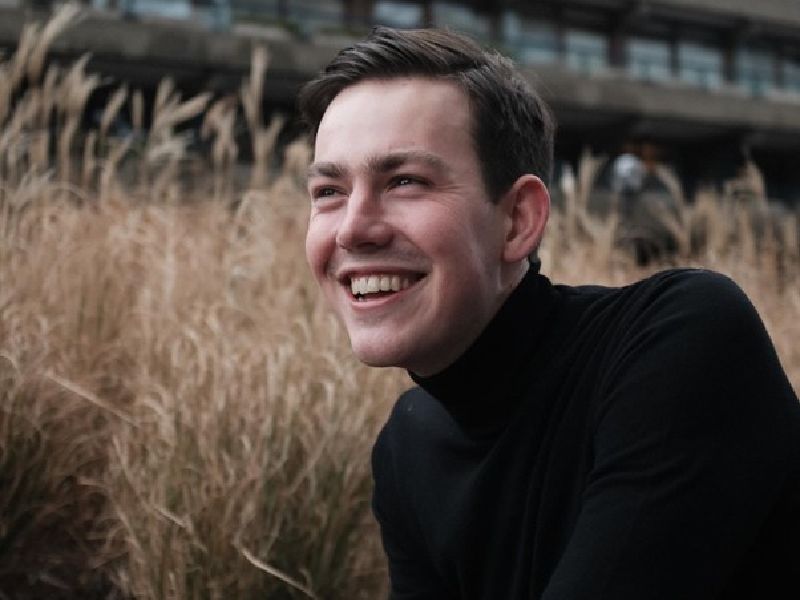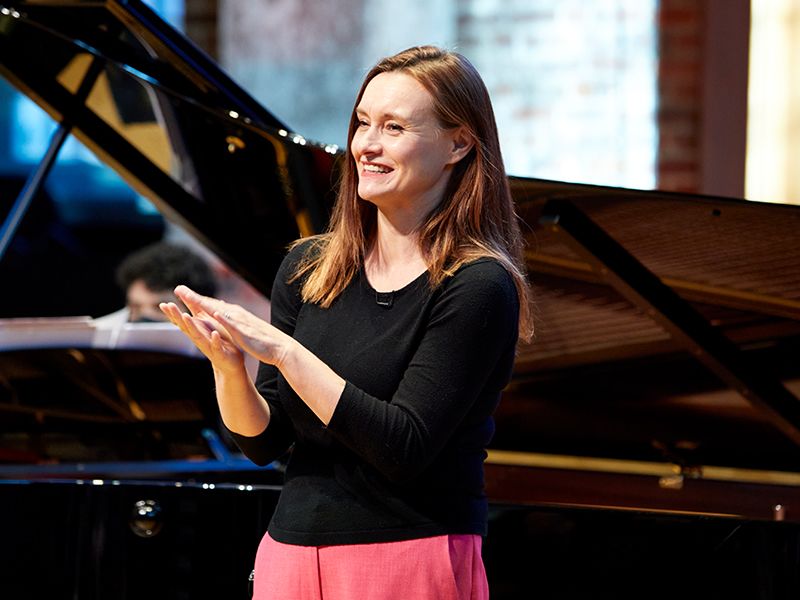LSO Discovery
Free Friday Lunchtime Concert

TODAY'S CONCERT
Luciano Berio Azerbaijan Love Song from ‘Folk Songs’
Antonio Vivaldi Gemo in un punto e fremo from ‘L’Olimpiade’
Gustav Mahler Lob des Hohen Verstandes from ‘Des Knaben Wunderhorn’
Samuel Barber Solitary Hotel from ‘Despite and Still’
Henriëtte Bosmans Complainte du petit cheval blanc and Les Médisants from ‘Dix mélodies’
Kurt Weill I’m a Stranger Here Myself from ‘One Touch of Venus’
George Gershwin Someone to Watch Over Me from ‘Crazy for You’
William Bolcom Amor from Cabaret Songs, Volume 1
Emmanuel Chabrier Enfin je me sens mieux from ‘L’étoile’
Roza Herwig mezzo-soprano
Edward Picton-Turbervill piano
Rachel Leach presenter
USING YOUR DIGITAL PROGRAMME
- Connect to the free hawksmoor WiFi network.
- Navigate using the menu icon (≡) at the top of the screen.
- Please set your phone to silent and don't use other apps during the music.
Luciano Berio (1925 to 2003)
Folk Songs
✒️ 1964 | ⏰3 minutes

11 Azerbaijan Love Song
Luciano Berio was an extremely important and influential Italian composer. His music often deconstructs text, quotes other famous pieces, features extended playing techniques, and is best described as post-modernist. Throughout his long career, Berio always had an eye on the past; he transcribed many famous works from Gustav Mahler to Johannes Brahms and 'completed' Giacomo Puccini's Turandot and Franz Schubert's Symphony No 10. He is now widely regarded as one of the most influential figures of the twentieth century. During the 1960s, he moved to the United States and began writing pieces for his then-wife soprano Cathy Berberian. One of the most famous of these pieces is his Folksongs, written to display her ‘extraordinary vocal artistry’. Cathy discovered the 'Azerbaijan Love Song' on an old record and despite not speaking a word of the language, transcribed the whole thing. Berio then ‘recomposed’ it.
Note by Rachel Leach
Antonio Vivaldi (1678 to 1741)
Gemo in un punto e fremo from 'L'Olimpiade'
✒️ 1734 | ⏰3 minutes

Antonio Vivaldi is thought of now as one of the greatest of all Baroque composers. However, for much of his lifetime, he was simply a violin teacher at an orphanage for girls in Venice. The girls were all trained musically and then performed in ensembles to provide added income for the institution. Vivaldi therefore had musicians in abundance to try out his compositions, which until 1713 were mostly concertos. By the mid-1700s opera was the number one entertainment genre and Venice had a lot of theatres competing for the best new works, so Vivaldi switched to opera composer and impresario (a manager of an opera company). L’Olimpiade is an opera from this time and tells a stormy love story set during the Olympic games. This song, with Vivaldi’s classic stabbing accompaniment, is about the drama, passion and pain of unrequired love. The title translates as ‘All at once I groan and shudder’.
Note by Rachel Leach
Gustav Mahler (1860 to 1911)
Des Knaben Wunderhorn
✒️ 1808 | ⏰3 minutes

10 Lob des Hohen Verstandes
Gustav Mahler was born in Eastern Bohemia into a humble family. His father was an innkeeper and young Gustav was one of 14 siblings. He took to music at a young age, playing the piano from the age of four and in public from ten. In his small town he was known as a ‘wunderkind’ (child prodigy) and supported in his musical studies. After graduating from Vienna Conservatoire he began a career as opera conductor moving from one job to the next and gradually rising up through the ranks. Composing took second place behind this and it was only long after his death that he was celebrated as one of the finest composers of the early 20th century. Das Knaben Wunderhorn is a series of twelve songs originally written for orchestra on the topic of youth and lost innocence and based on traditional German folk poems. This one is about a donkey judging the singing of two birds. The title translates as ‘In praise of lofty intellect’.
Note by Rachel Leach
Samuel Barber (1910 to 1981)
Despite and Still
✒️ 1969 | ⏰3 minutes

4 Solitary Hotel
Samuel Barber was born into a musical family in Pennsylvania, US. His aunt was a famous contralto and his uncle was a composer of art song. So it seems almost inevitable with that background that he would grow up to become one of the best art song composers of the 20th century. Despite and Still is a collection of five songs written in 1968. Barber was deeply unhappy after the failure of his second opera and was physically unwell during this period. The texts of these dark songs reflect his emotional state and are all about loneliness and solitude. The music is more ‘difficult’ and demanding on the performer than his other songs and therefore they are much less well known. This one, with words by the poet and novelist James Joyce, is sad, mysterious and beautiful.
Note by Rachel Leach
Henriëtte Bosmans (1895 to 1952)
Dix mélodies
✒️ unknown | ⏰3 minutes

5 Complainte Du Petit Cheval Blanc
2 Les Médisants
It is a scandal that we don’t all know Henriëtte Bosmans’ name! She was an extremely famous Dutch concert pianist and later, composer. Born into a musical family, her father was principal cellist with Royal Concertgebouw Orchestra and her mother was a sought-after piano teacher. After performing with the great orchestras and conductors of Europe, Bosmans’ career came to a halt when World War II broke out and, being of Jewish heritage, her performances and music were banned. In 1942, her elderly mother was arrested and deported only to be saved by Henriëtte who then wrote a ‘song of liberation’ and was eventually knighted in 1951. Alongside all of this she was openly bisexual and towards the end of her life had a fruitful artist and personal partnership with mezzo-soprano Noémie Pérugia. These songs stem from that collaboration. Today we will hear 'Complainte du petit cheval blanc' (The complaint of the little white horse) and 'Les Medisants' (Gossips).
Note by Rachel Leach
Kurt Weill (1900 to 1950)
I’m a Stranger Here Myself from 'One Touch of Venus'
✒️ 1943 | ⏰3 minutes

German-born Austrian composer Kurt Weill was a child prodigy who became one of the leading composers for stage. His works fall into two categories, before and after World War II. Before, he collaborated with playwright Bertolt Brecht, wrote several works for the concert hall, and embraced his Jewish heritage. During and after the war, having moved to the US in 1935 and taken US citizenship, he rarely spoke German and threw himself into writing for Broadway. His fame grew but sadly he died after suffering a heart attack aged just 50. ‘I’m a Stranger Here Myself’ was written in 1943 with words by Ogden Nash. It featured in the musical One Touch of Venus which tells the tale of a forgotten statue of Venus coming to life and falling for the ‘wrong’ man. The song is sung from Venus' perspective.
Note by Rachel Leach
George Gershwin (1900 to 1950)
Someone to Watch Over Me from 'Crazy for You'
✒️ 1992 | ⏰4 minutes

George Gershwin had his first (huge) success at age 19 with the song 'Swanee'. A few years later he had a string of hit shows on Broadway but it was in the world of ‘classical’ music that self-taught Gershwin longed to be respected. He stepped into that world with Rhapsody in Blue which expertly blended new jazz sounds, harmonies and rhythms with a romantic orchestral texture. Had he not died tragically young at age 39, he undoubtedly would have gone on to be an important figure on and off Broadway. 'Someone to Watch Over Me' is one of his most famous and beloved songs. It was originally written for the musical Oh Kay (1926) and then used in Crazy for You (1992). Now thought-of as the quintessential torch-song (a sentimental song typically about unrequited love), Gershwin originally wanted it performed ‘fast and jazzy’ with a lively swing feel.
Note by Rachel Leach
William Bolcom (born 1938)
Cabaret Songs
✒️ 1978 | ⏰3 minutes

6 Amor
William Bolcom is an American composer. Born in Seattle, he studied composition at the University of Washington and went on to study with Darius Milhaud and Olivier Messiaen, two very important composers of the 20th century. He is married to mezzo-soprano Joan Morris, with whom he frequently collaborates on performances and recordings. Amongst his works is a large-scale song-cycle – including soloists, chorus, and orchestra – of William Blake’s Songs of Innocence and Experience, written over a period of 25 years! However, Bolcom is also known for his foray into popular 20th century styles such as ragtime and cabaret. Today we will hear the song ‘Amor’ ('Love') from his collection Cabaret Songs.
Note by Alice Manning
Emmanuel Chabrier (1841 to 1894)
Enfin je me sens mieux from 'L'étoile'
✒️ 1877 | ⏰1 minute

While not as familiar to us today as some of his contemporaries, Emmanuel Chabrier was an influential French composer living and working in the time of the Belle Epoque (a period of European history from 1871 to 1914). Although he showed promise in music lessons as a child, he was discouraged from following this passion by his father, who wanted Chabrier to follow him into the legal profession. And so he did, working as a civil servant for many years before devoting himself solely to composition from 1880. Therefore largely self-taught, Chabrier’s style evolved to push at the boundaries of Romantic composition and he is seen as paving the way for French modernism to emerge in the early 20th century. ‘Enfin je me sens mieux’ translates to ‘Finally, I feel better’ and is taken from Chabrier’s 1877 opera L’étoile, a comical piece which satirises the follies of royalty.
Note by Alice Manning
About the Artists


Roza Herwig
mezzo-soprano
The versatile Dutch mezzo-soprano Roza Herwig (1996) sings, acts, presents, plays the violin and writes theatre texts. After obtaining her bachelor’s degree in Classical Voice from the Conservatory of Amsterdam, Roza finished her vocal studies with distinction in the Artist Masters at the Guildhall School of Music & Drama in London in 2023. She continues her studies at Guildhall with the Artist Diploma.
Roza has won prizes in the National Finals of the Princess Christina Competition, at the Britten Violin Competition and was nominated for the Talent Prize Overijssel. Recently she won the Charters Surveyers Competition and sang in the semifinals of the prestigious International Vocal Competition in Den Bosch.
In addition to singing as a soloist with the North Netherlands Symphonic Orchestra, the East Netherlands Symphonic Orchestra, the Bauhaus Band and the Netherlands Chamber Orchestra, with whom she made her debut at the Royal Concertgebouw in Amsterdam, Roza often appears in concerts, recitals and performances. She has performed at the Barbican, Vortex Jazz Club and at several festivals, such as the Tête à Tête Festival in Cornwall, Schiermonnikoog festival, O Festival and the Grachtenfestival. Roza sang multiple times on Dutch radio ‘NPO Radio4’ and on the TV program Podium Klassiek. In January 2021 Roza sang and played the leading role in an opera production of Arnold Schönberg’s Pierrot Lunaire in Munich and in 2022, Roza portrayed the role of Cherubino in a production of Le Nozze di Figaro by Wolfgang Amadeus Mozart at the National Liberal Club in London. This summer she will sing a role in an opera production from Holland Opera in The Netherlands.

Edward Picton-Turbervill
piano
Edward Picton-Turbervill is a Junior Fellow in the Keyboard department at Guildhall School of Music & Drama, having recently completed a Master’s in piano accompaniment there, studying with Caroline Palmer. He was the Organ Scholar at St John’s College, Cambridge, where he read Music. He toured and broadcast regularly, and his third CD with the choir, Deo, was named BBC Music Magazine’s Choral Disc of the Year.
From 2018 to 2021, he was Head of Music at Atlantic College, where he oversaw a major refurbishment of the music buildings, and steered the department through the pandemic. He is committed to music education and outreach, and works as organist at St John the Divine, Kennington, assisting with the church's renowned youth programme.
Edward is the founder of Pipit, a company which exists to bring song recitals back into people’s homes. He also composes for singers and choirs, and tries to include a new work in every concert. He has appeared as Benjamin Britten at the Royal Opera House in a newly-commissioned play, A Letter from Ben, and toured Europe in November 2022 as part of Open Your Eyes, an environmental song project curated by pianist Iain Burnside. In June 2023 he took up a place as a Young Artist at Leeds Lieder, and won the accompanist’s prize in the AESS English Song Prize. He performs regularly on BBC Radio 3, most recently with Carolyn Sampson, Esther Abrami and Eldbjørg Hemsing.
Rachel Leach
presenter
Rachel Leach was born in Sheffield. She studied composition, and her music has been recorded by NMC and published by Faber. She has won several awards including, with English Touring Opera (ETO), the RPS award for best education project 2009 for One Day, Two Dawns.
Rachel has worked within the education departments of most of the UK’s orchestras and opera companies. The majority of her work is for the London Symphony Orchestra and the London Philharmonic Orchestra. Rachel has written well over 20 pieces for LSO Discovery and 15 community operas, including seven for the English Touring Opera.
Increasingly in demand as a concert presenter, as well as presenting the LSO Discovery Free Friday Lunchtime Concert series, she regularly presents children’s concerts and pre-concert events for the LSO, LPO, Philharmonia Orchestra, Scottish Chamber Orchestra, Royal College of Music and Royal Northern Sinfonia.
Next Friday Lunchtime Concert - Relaxed Performance
Friday 23 February 2024
Wolfgang Amadeus Mozart Adagio-Allegro from Duo for Violin and Viola in B-flat major K424
Antonio Bartolomeo Bruni Allegretto scherzando from Duo No 4 in D major, 6 Duos Concertants Book 4
Johan Halvorsen Sarabande con variazioni on a Theme by George Frideric Handel for Violin and Viola
Traditional arr Kae Hirakawa Sakura-Sakura Variations
Naoko Keatley violin
Mizuho Ueyama viola
Angie Newman BSL interpreter
Rachel Leach presenter
Relaxed concerts are particularly suitable for individuals or groups who feel more comfortable attending concerts in a relaxed environment. Everyone is welcome, including people who have sensory and communication impairments, learning disabilities, or who are neurodiverse.



